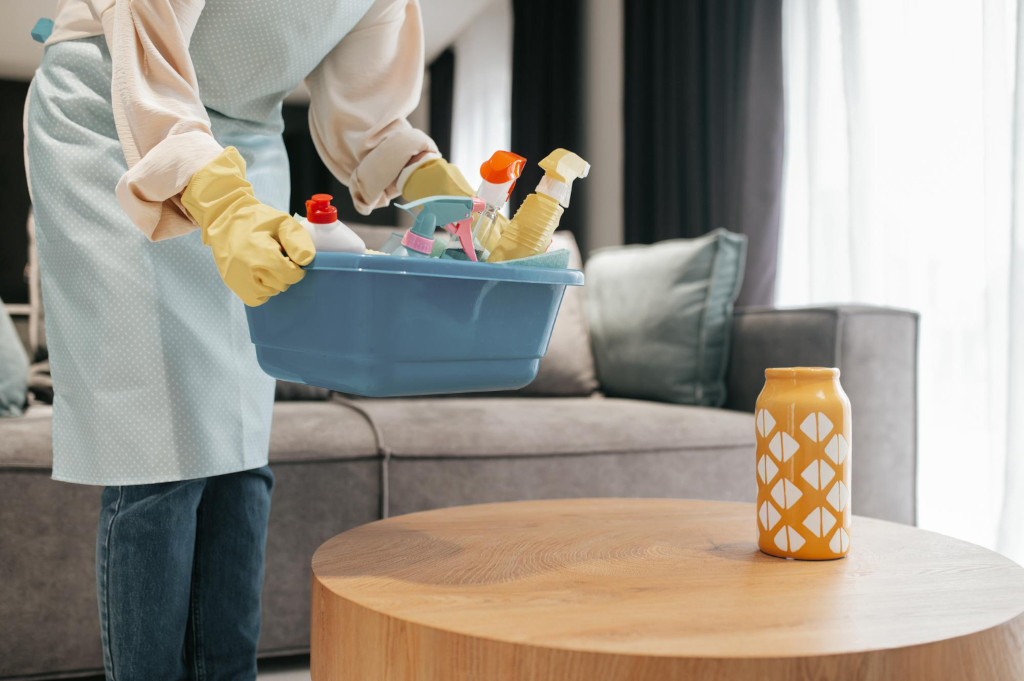SingaporeMotherhood | Parenting
July 2023
Preparing for the Arrival of Your Domestic Helper in Singapore

Singapore’s reliance on domestic workers is undeniable. As of December 2022, the number of Migrant Domestic Workers in the country stood at 268,500. Hiring a domestic helper can be a daunting task for many first-time hirers, especially if you are unfamiliar with the process. If it’s your first time, a good agency will help you through all the official business of contracts and work permit applications. But as experienced employers know, the process doesn’t end there. In fact, it’s only just beginning.
In this simple guide, we walk you through the nitty gritties of hiring a domestic helper, from preparing for her arrival to managing the employer-helper relationship.
(See also: Hiring a Domestic Helper? Be Aware of these Hidden Costs)
Preparing for Your Domestic Helper’s Arrival
Before your new live-in domestic helper arrives, there are a few essential steps to carry out to make sure her arrival is as smooth, comfortable, and fuss-free as possible.
1. Get your paperwork in order
Before she arrives, it is of paramount importance that you’ve gotten all necessary paperwork in order. Make sure you’ve applied for a work permit and purchased medical insurance for your domestic helper. First-time employers also need to complete an Employers’ Orientation Programme online (or in person).
2. Set up suitable living quarters for her
It is also necessary to ensure that your home is suitable for a live-in helper. At the bare minimum, you need to provide a separate living space for your helper. This should include include a bed, storage, and a place to cook and wash.

3. Purchase essential supplies and equipment
Remember, if it’s difficult for you to do it, it’s difficult for your domestic helper as well. Make sure you purchase necessary supplies and equipment, such as cleaning supplies, toiletries, and cooking utensils for your domestic helper to carry out her job to the best of her abilities.
(See also: Budget 2023: Bigger Baby Bonus + More Benefits and Subsidies for Parents)
4. Give your helper access to the internet and a mobile phone
Internet and mobile phone access are very important for your helper. She needs to stay connected with her family and friends back home for peace of mind. This helps her have a healthy work-life balance and keep her spirits up.
5. Create a reasonable work schedule
Creating a schedule for your domestic helper helps both of you adjust to the new living situation. She is now working in your house and you now have someone new living with you. A well-designed schedule not only helps your domestic helper adjust to her new role. It also sets out clear expectations from both you and herself regarding the tasks that need doing. This can help your domestic helper manage her time as well.
It is recommended that you create the work schedule in consultation with your domestic helper so that she is agreeable to it as well. Write out the schedule in English and any other languages your domestic helper speaks, such as Bahasa or Burmese. Overall, the schedule will help avoid conflicts by getting everyone on the same page about what’s expected.
Here’s a sample with examples that you can use to create your own:
| Daily – Make beds – Send children to school – Collect laundry – Wash toilets, wipe down bathrooms – Fetch children from school – Wash dishes and sanitise food preparation areas – Mop kitchen floor – Take out trash and replace trash bags – Put things away/tidy up Monthly Every 1st Wednesday – Clean inside water boiler with citric acid Every 1st Saturday – Clean & condition leather sofa Every 3rd Saturday – Dust outside air-con units & wash filters Special Tasks 2nd week January – Spring-cleaning April & October – Wash blankets & cushions | Weekly Monday – Children’s room (dust surfaces, wipe windows) – Vacuum floors Tuesday – Study room (dust surfaces, wipe windows) – Laundry (wash & hang towels, bed linens) Wednesday – Kitchen (dust surfaces, wipe windows, wash rubbish bin, clean fridge, wash cleaning cloths) – Vacuum floors Thursday – Master bedroom (dust surfaces, wipe windows) – Laundry (wash & hang clothes) Friday – Surfaces and walls (clean smudges, etc) – Air purifier (inside/outside body, air quality sensor, vacuum filters) – Mop floors Saturday – Checks and repairs (lights, appliances, clothes, etc) – Iron school uniforms Sunday – Rest day |
Communicating Expectations
Communication is key to any harmonious relationship in and out of work. This is all the more the case when your home is someone’s workplace. You must therefore set clear guidelines and expectations for your helper’s duties and responsibilities to avoid misunderstandings and conflicts.
You should establish rules and boundaries within the household. For example, what areas your helper can and cannot enter, drawers she shouldn’t open, and tasks she is responsible for. Creating a positive and respectful working environment helps your helper feel comfortable and motivated to do her job well.
(See also: Does your child feel unmotivated to study? A mother did THIS and her child is now transformed!)
Of course, it is essential to be patient and understanding when communicating with your helper, especially if there are language barriers. Imagine if you were alone in a foreign country and couldn’t speak the local language well. You’d be apprehensive and scared to start a new job as well.
Tools such as Google Translate can help overcome your communication barriers. Keeping an open mind to learning words and phrases from your helper’s native tongue is also a good idea. This can help foster a good relationship between you and your helper.
Training Your Domestic Helper

With new domestic helpers, you will probably need to provide training and guidance for an initial period of time to ensure that she knows how to perform her duties effectively and safely. Explain and demonstrate how to carry out basic household duties and routines, such as cleaning, cooking, and laundry. This is especially important if you have specific personal preferences in your household routines. You should also teach your helper how to handle household appliances and equipment safely to avoid accidents.
Of course, for those who have children with special needs, additional training for your domestic helper may be required. Or you may have elderly with specific care needs like wound dressing or chronic conditions like diabetes. You should also teach your helper essential communication skills they may need to interact with family members who may have their own communication quirks as well.
(See also: Are You a Caregiver for Your Child? – Please Read This (+ True Life Stories))
Personal hygiene and cleanliness should also be emphasised, as this is crucial for maintaining a healthy and hygienic living environment.
Discuss and agree upon internet and phone usage, as well as rest times, during training as well. Your helper should be given adequate rest times and allowed to use the phone and internet during her free time.
Using the schedule that you created with her can be a good way of helping your helper improve as well. Speak to her and engage in dialogue about the ways she has met or exceeded expectations. Conversely, point out to her which tasks in the schedule she needs to improve further on.
Managing the Employer-Helper Relationship
Building a positive working relationship with your helper is crucial to ensuring a harmonious household. This also gives you peace of mind when you’re not there to supervise her. To build a positive working relationship, consider the following tips:

1. Show appreciation
At any workplace, everyone wants to feel appreciated and know that their work is valued. Your domestic helper is no different. Show appreciation by thanking her and consider providing perks or other incentives as a reward when appropriate.
2. Communicate effectively
Often while we assume that we communicate perfectly based on how our daily interactions with loved ones or colleagues, we may actually still have communication flaws which are magnified when communicating with others foreign to our culture and country. Think about how you can improve your communication skills and always check in with your domestic helper if you have practised clear and effective communication with her.
3. Treat your helper with respect and dignity
It’s not easy being alone in a foreign country to work far away from family. Any worker in any industry and any country has the right to expect respect and dignity from their employers. So even if she makes mistakes that annoy or frustrate you, always take a step back first. Consider if your behaviour is something you would find acceptable as an employee yourself. Treat others with respect and dignity and they will be incentivised to reciprocate; your domestic helper is no different.
(See also: How to Teach your Children Respect)
Conflicts and issues may arise in any relationship, and it is essential to address them in a constructive manner. Listening to your helper’s concerns and finding solutions together can help prevent issues from escalating. Likewise, doing your part to understand cultural differences and adapting to them can also help avoid misunderstandings and conflicts.
This article first appeared on Homage, an award-winning personal care solution that provides on-demand holistic home and community-based caregiving and medical services to seniors and adults, allowing them to age and recover with grace, control, and dignity.
Featured image: katemangostar on Freepik
All content from this article, including images, cannot be reproduced without credits or written permission from SingaporeMotherhood.
Follow us on Facebook, Instagram, and Telegram for the latest article and promotion updates.





